
Understanding the best probiotic for bloating is essential for relieving individuals suffering from digestive discomfort. Bloating is a common issue that results from different factors like diet, stress, and gut imbalance. The right probiotic supplements can help manage symptoms by promoting the growth of healthy gut bacteria and improving digestion in general.
At Nudge, we believe in the progress of gut health through best-in-class probiotic formulations aimed at bloating. Our intentionally selected ingredients nurture the gut microbiome for a balanced digestive system free from discomfort. For maximum alleviation, we focus on strains scientifically proven to be among the most potent against bloating.
This guide considers factors that will help one choose the best probiotic for bloating, including strain selection, CFU count, and delivery methods. Next, we will discuss possible side effects from probiotic intake and mention a few of the best probiotics currently on sale, underlining their benefits for digestion. By the end, you’ll be confidently equipped to make informed decisions about your probiotic choices and enhance your gut health effectively.
Let’s jump in!
Best Probiotic for Bloating: Key Probiotic Strains
The best probiotic for bloating is vital in promoting digestive health. Various strains target specific digestive issues, providing tailored relief for individuals experiencing discomfort. Understanding these critical probiotic strains can empower individuals to make informed choices for effective bloating management.
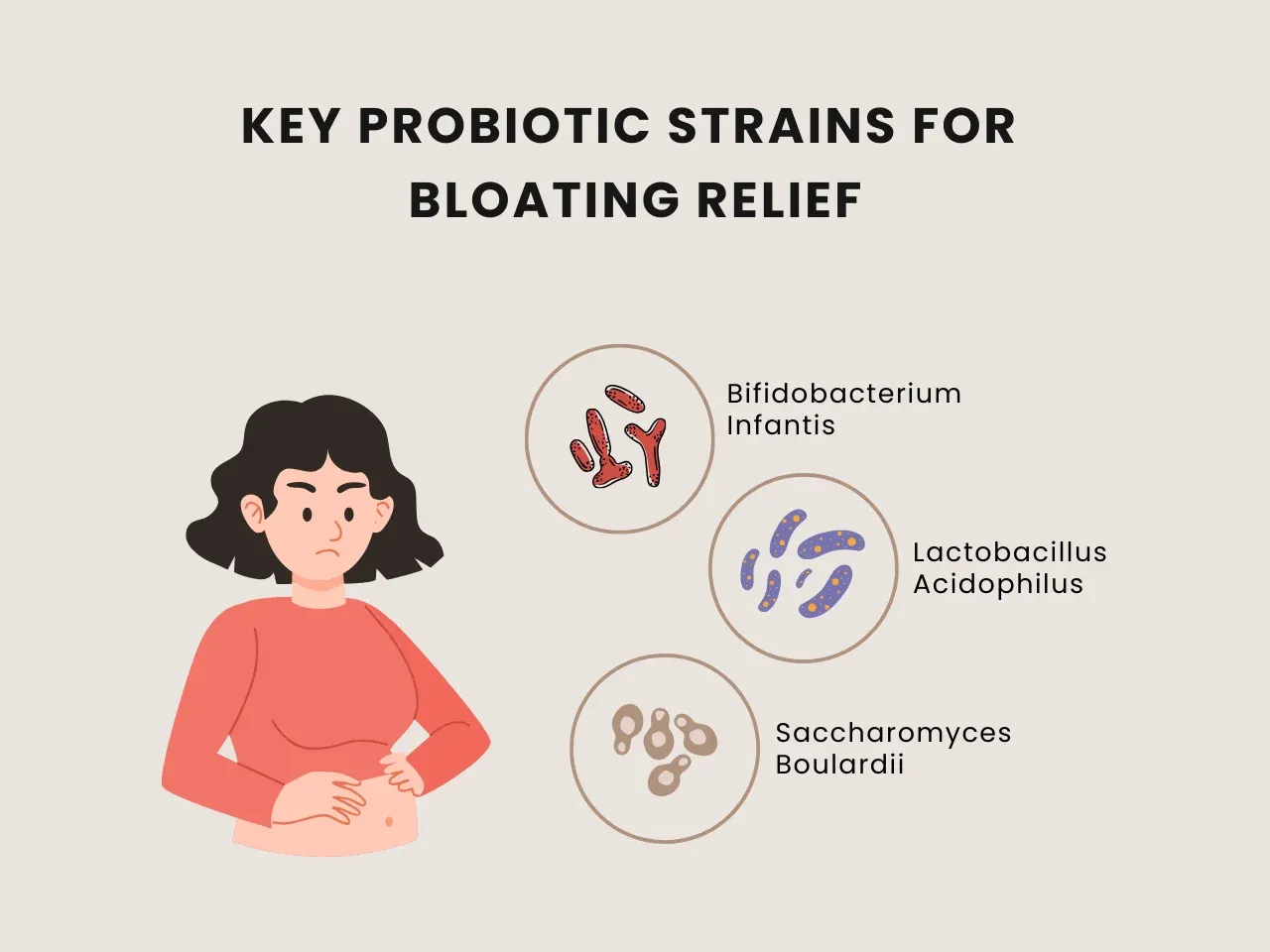
Bifidobacterium Infantis
Bifidobacterium infantis, a probiotic strain, is essential to gut health and meaningful to bloated individuals. It is highly effective in cases of IBS and inflammatory disorders of the gut. Learn below about its benefits, which help reduce bloating, improve gut motility and frequency of bowel movements, reduce inflammation, and maintain overall gut health.
- Minimizing Bloating: Bifidobacterium infantis is very effective in cases involving irritable bowel syndrome or inflammatory digestive system issues, wherein bloating could be the primary complaint.
- Improved Gut Motility: The strain enhances food movement through the intestines, thereby reducing the chances of gas build-up unequivocally and bloating.
- Bowel Movement: It helps regulate bowel movements, reduces bloating due to constipation, and makes digestion smoother.
- Reducing Inflammation in the Gut: This probiotic strain decreases inflammation in the gut, a common factor in IBS and other digestive conditions that cause bloating.
- Immune Response Modulation: Bifidobacterium infantis helps modulate the immune activity of the intestinal tract, balancing such activity to ensure a healthy digestive environment.
- Backed by Research: Various studies have boasted Bifidobacterium infantis's effectiveness for bloating. Many experiments will find that those subjects who received this probiotic had remarkable reductions in bloating, gas, and abdominal discomfort, as well as among IBS sufferers.
- Clinical Evidence for Trials: In one clinical trial, the American Journal of Gastroenterology reported that subjects with IBS showed a consistent decrease in bloating symptoms. This improvement was due to the addition of Bifidobacterium infantis to their regimen.
Lactobacillus Acidophilus
Lactobacillus acidophilus is a probiotic strain celebrated among probiotics. It aids the gut through better digestion in those with lactose intolerance. It primarily produces lactase, an enzyme that breaks down lactose, reducing bloating and discomfort after dairy consumption. This potent probiotic balances gut bacteria, promoting healthy gut flora and enhancing digestive health. Here’s how:
- Lactose Digestion: This probiotic strain produces the lactase enzyme responsible for lactose digestion, a form of sugar in milk. More precisely, this will significantly benefit lactose intolerant people, reducing bloated feelings and discomfort after consuming dairy food.
- Reduces Bloating from Lactose Intolerance: This helps reduce the bloating and discomfort that usually follows the consumption of food containing lactose, which is quite common in lactose-tolerant individuals.
- Balancing Gut Bacteria: Lactobacillus acidophilus increases the population of helpful bacteria in the gut and decreases the number of harmful pathogens. This balance helps maintain a healthy gut microbiota, which is essential for smoother digestion and reducing bloating, gas accumulation, and abdominal discomfort.
- Maintaining Healthy Gut Flora: This probiotic helps support a healthy microbiome, strengthening the gut. It also increases resistance against digestive issues and food sensitivities that can cause bloating and affect food absorption.
- Improvement in Digestive Health: There is significant evidence from studies regarding using Lactobacillus acidophilus to manage digestive discomfort. Regular supplementation can improve digestion and reduce bloating symptoms. It serves as a practical solution for those who frequently experience this issue.
Saccharomyces Boulardii
Saccharomyces boulardii is a specific yeast-based probiotic with gut-friendly properties and the capability to reduce bloating. It is a potent probiotic strain and is highly inhibitive against pathogenic bacteria and fungi. This strain can help you reduce bloating associated with bacterial imbalance, infection, or antibiotic intake and support general digestive health through the following:
- Pathogenic Bacteria Control: This probiotic yeast inhibits the growth of pathogenic bacteria and fungi, keeping the gut microbiome healthy. It can also stop harmful bacteria from growing. It helps lower inflammation in the gut and can improve the immune system's ability to fight germs.
- Reducing Bloating from Bacterial Imbalances: Saccharomyces boulardii is an effective treatment for reducing bloating and discomfort symptoms caused by gut imbalances. It controls harmful bacteria.
- Address Antibiotic-Induced Bloating: This potent probiotic can resolve bloating following infection or antibiotic use. Antibiotic use can also be associated with an imbalance in the normal bacterial flora of the gut, overgrowing pathogenic organisms responsible for bloating, and other symptoms.
- Mitigating Antibiotic-Related Digestive Issues: It helps balance the action of antibiotics, which promote bloating, gas, and diarrhea by stimulating healing in your gut lining and restoring natural microbiota balance.
- Diarrhea and Gut Imbalance Management: Saccharomyces boulardii can decrease the duration and severity of diarrhea, particularly in gastrointestinal disturbances. Its properties enhance gut function and support regular bowel movements, helping reduce bloating and other similar gastrointestinal complaints.
- Harmful Bacteria Prevention: Saccharomyces boulardii can stop harmful bacteria from growing. It helps lower inflammation in the gut and enhances immune health. Because of these benefits, it is beneficial for bloating, which is linked to digestive infections and issues caused by external factors, as well as symptoms of irritable bowel syndrome.
How Probiotics Work to Reduce Bloating
Probiotics for bloating work on many levels to help reduce bloating by restoring the balance of good and bad bacteria in the gut. They reduce inflammation and the production of gas, the frequent cause of bloating. Understanding how probiotics for bloating work puts every individual in a position to make an informed choice about their gut health and effectively relieve discomfort.
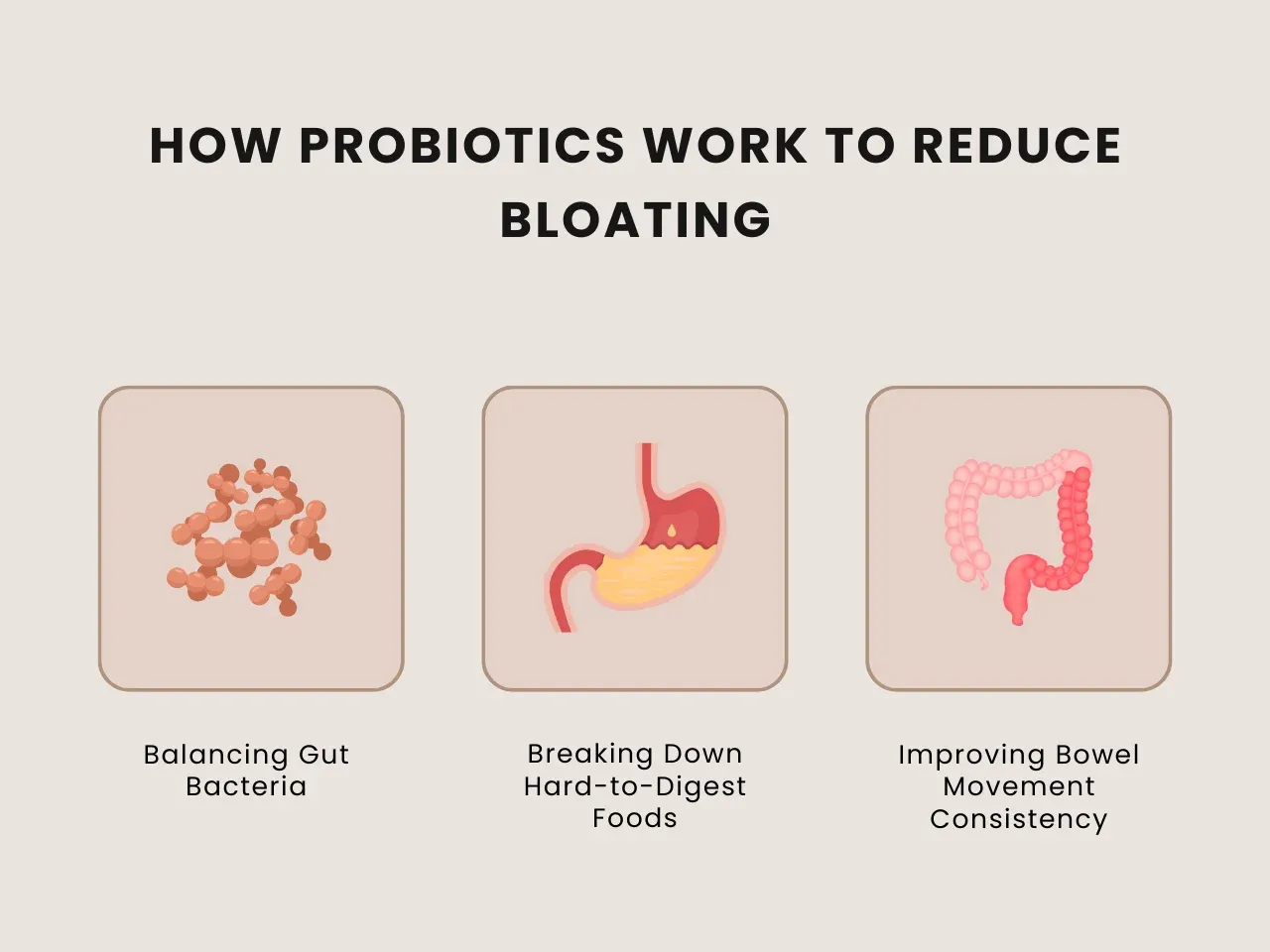
Balancing Gut Bacteria
Probiotics for bloating are live microorganisms that promote a healthy gut by balancing good and bad bacteria. Bad bacteria tend to overgrow and cause inflammation, which results in gas accumulation and bloating. This process supports a healthier gut flora composition, reducing inflammation and gas production, which benefits healthy people seeking to maintain a healthy immune system.
Breaking Down Hard-to-Digest Foods
Probiotics, such as Lactobacillus acidophilus, can effectively digest indigestible foods like lactose and complex carbohydrates aided by digestive enzymes produced by these probiotics. This digestive process is particularly effective when taken on an empty stomach, as it reduces fermentation within the gut. This is commonly associated with the production of excess gas and bloated stomachs, especially among those with lactose intolerance.
Improving Bowel Movement Consistency
The benefits of probiotics, such as Bifidobacterium, include enhancing the frequency and texture of stool, which can be particularly helpful for managing IBS symptoms. Because of regular bowel movements, accumulating less stool will reduce the development of gas, which may lead to bloating. Probiotics reduce the discomfort of bloating while making the digestion process effective and efficient.
Choosing the Best Probiotic Supplement for Bloating
The secret to a good and effective probiotic supplement is improving bloating and gut health. With many options available, identifying the factors determining a probiotic's effectiveness—such as strain selection, lifestyle changes, and delivery method—is essential. This careful consideration will help you choose a probiotic that aligns with your gut health needs.
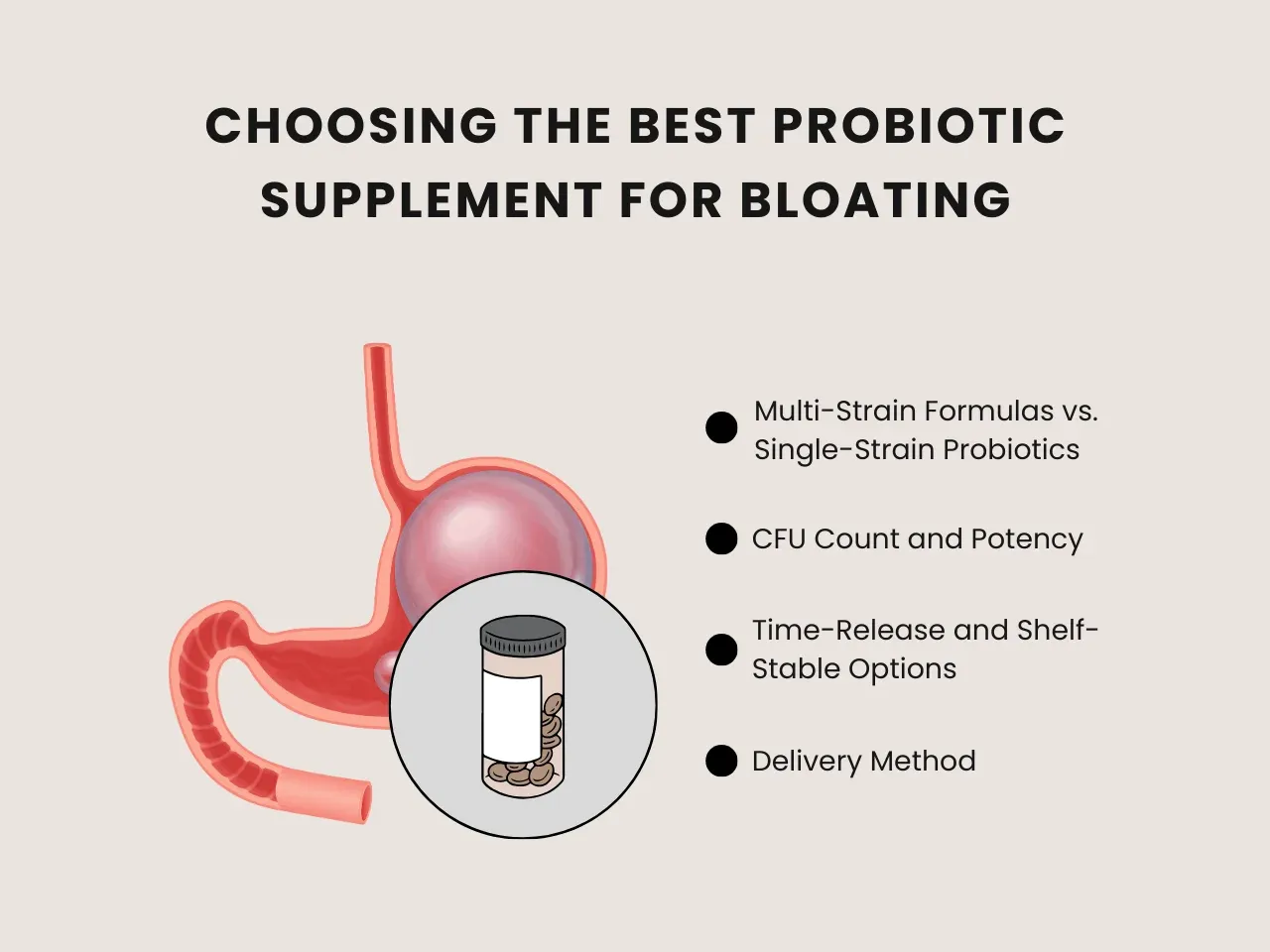
Multi-Strain Formulas vs. Single-Strain Probiotics
Several key questions can help determine their effectiveness for digestive health when comparing multi-strain and single-strain probiotics. Multi-strain probiotics for bloating offer a broader range of benefits by combining different strains, such as bacillus coagulans, targeting specific gut issues. Explore the differences to find the right probiotic that effectively addresses your unique digestive concerns and alleviates symptoms like bloating and discomfort.
Multi-Strain Formulas
- More Extensive Digestive Reach: Multi-strain formulas combine a variety of live bacteria, each normally acting on specific aspects of gut health. As a result, such diversity can deal with many digestive complaints, including balancing gut flora, reducing inflammation, and enhancing digestion.
- Target Multiple Causes of Bloating: Multi-strain probiotics can simultaneously target several aspects of gut health, effectively treating bloating due to various causes. Therefore, multi-strain probiotics will be particularly effective for people suffering from complicated digestive issues and provide a more holistic approach to improving gut health.
- Enhanced Efficacy: This approach enhances effectiveness by combining different probiotic strains. For example, Bifidobacterium infantis can relieve gas, while Lactobacillus acidophilus aids in lactose digestion. Together, they address bloating from multiple sources, making it suitable for individuals with diverse digestive challenges.
Single-Strain
- Targeted Support: Single-strain probiotics for bloating are a targeted solution for people with digestive issues like IBS or food intolerances. This approach helps better address the symptoms related to each specific condition.
- Effective for the Specific Conditions: Single strains focus on specific symptoms. For example, Bifidobacterium lactis helps reduce abdominal pain and bloating in IBS. This makes it especially helpful for people with certain digestive issues.
- Simplified Supplementation: Single-strain probiotics make it easier for some people to find the right supplement, helping address their specific digestive health needs.
- Less Complexity: Single-strain probiotics reduce the likelihood of interactions between different strains, simplifying the assessment of symptom changes. This straightforward approach is especially beneficial for individuals wanting to monitor their response to a specific probiotic, including those undergoing drug administration.
CFU Count and Potency
The CFU count in probiotics for bloating is a crucial measure of their effectiveness for gut health. It indicates the number of live bacteria capable of surviving in one serving and correlates with the potential health benefits, including weight loss and relief from gastrointestinal symptoms. Understand these key aspects to help guide your probiotic choices to support better digestion and overall wellness:
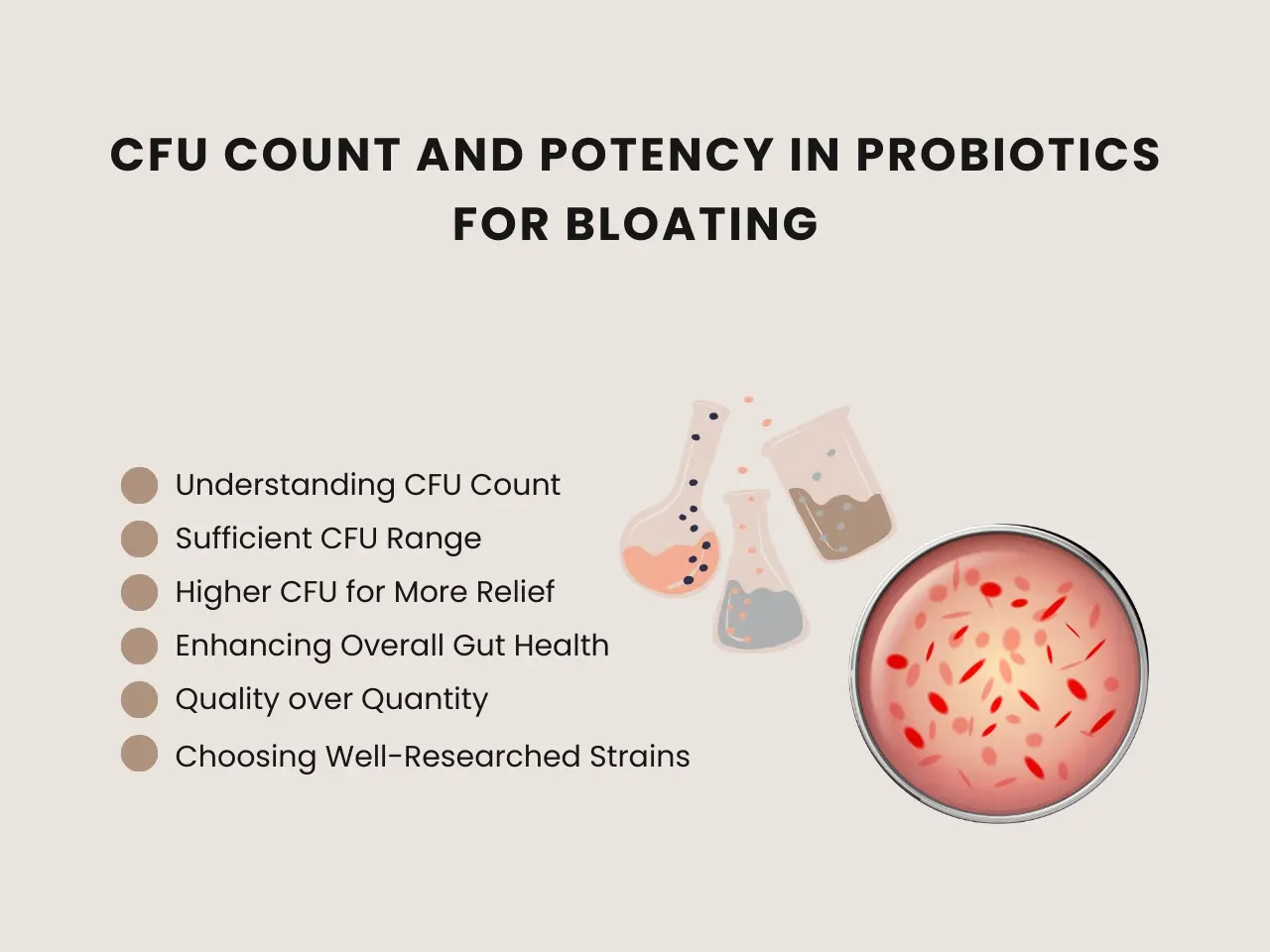
- Understanding CFU Count: CFU count is the abbreviation for 'Colony Forming Units' and is defined as the number of viable microbes in a probiotic dietary supplement. This measurement specifies the number of living microorganisms in a probiotic nutritional supplement.
- Sufficient CFU Range: A probiotic must be selected with a serving size between 10 billion and 50 billion CFU so that enough beneficial probiotics for bloating reach the gut and apply their salutary effects on digestion.
- Higher CFU for More Relief: High CFU has the potential to relieve symptoms of bloating faster and more completely. This is very helpful in chronic digestive problems, where a much higher dosage of probiotics for bloating can ultimately outcompete the harmful bacteria and balance your gut microbiome.
- Enhancing Overall Gut Health: A healthy population of gut-friendly bacteria may contribute to overall gut health by reducing inflammation and improving the regularity of the bowel. Probiotic treatment can also mitigate the effects of inflammatory bowel disease, making it essential for those suffering from such conditions.
- Quality over Quantity: Though the higher count of CFUs differs, this is not an assurance of effectiveness. The type of strains used, how well they can survive the digestive tract, and individual responses to probiotics for bloating are significant factors influencing their different effects.
- Choosing Well-Researched Strains: It's essential to select quality formulations that include well-researched probiotic strains tailored to address bloating and other digestive concerns. Additionally, those on a low FODMAP diet may find specific strains beneficial for managing their symptoms.
Researching dosage recommendations is essential for chronic bloating. On top of that, consulting a healthcare provider can help identify the proper combination of CFU count and strain for individual gastrointestinal symptoms. Higher dosages may be necessary for effective relief, so choosing a probiotic supplement can significantly improve bloating management.
Time-Release and Shelf-Stable Options
When selecting probiotics for bloating, time-release and shelf-stable options improve effectiveness and convenience. Time-release capsules deliver beneficial bacteria gradually for optimal gut health, while shelf-stable probiotics enable room-temperature storage, ensuring a consistent supplementation routine without refrigeration.
Benefits of Time-Release Probiotic Capsules
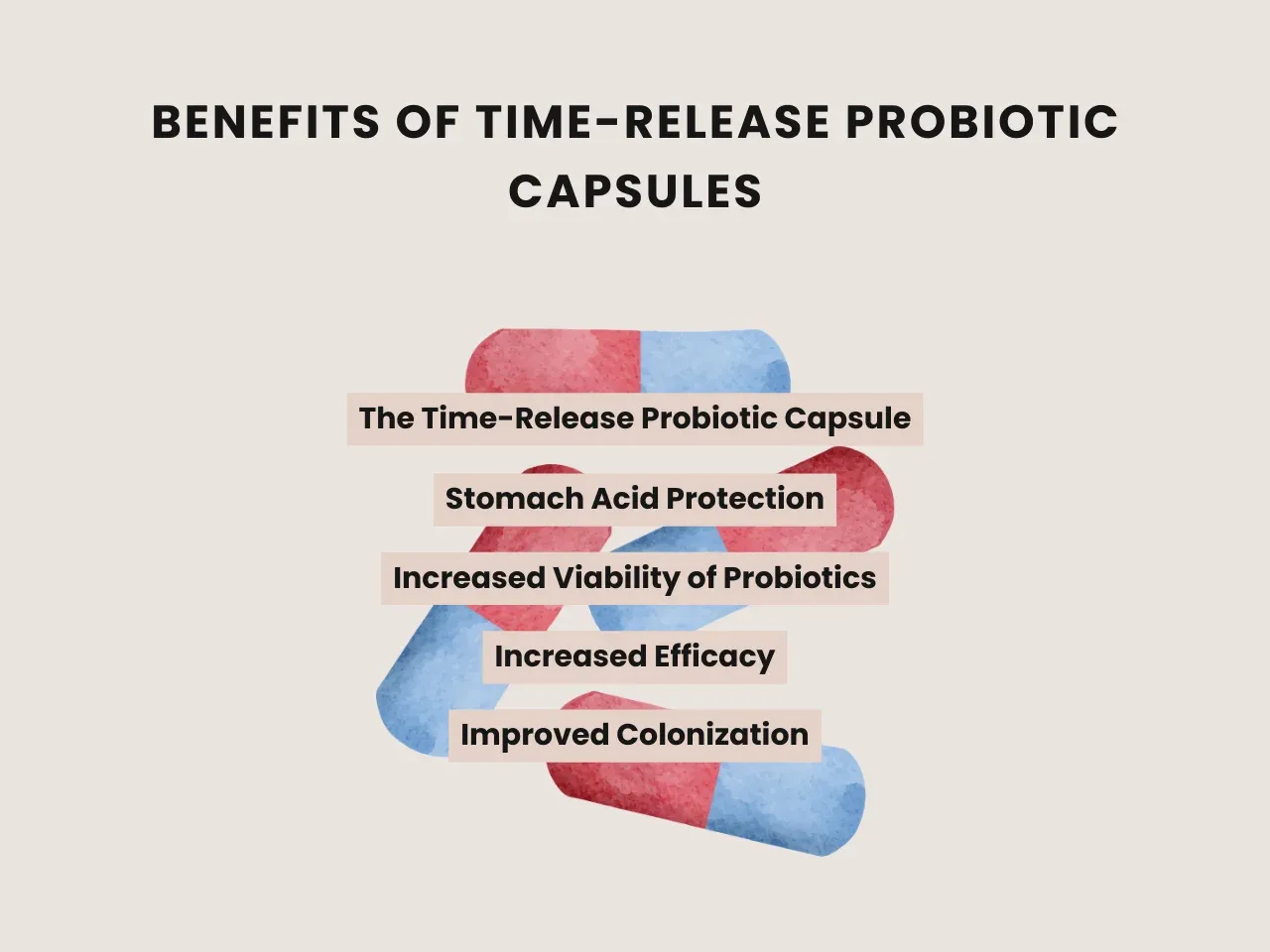
- The Time-Release Probiotic Capsules: The probiotic supplements have a time-release effect, which works by slowly releasing the good bacteria over a long time. This ensures that the probiotics for bloating are constantly released into the digestive system using controlled release.
- Stomach Acid Protection: Many strains of probiotics, such as Lactobacillus rhamnosus and Bifidobacterium bifidum, are sensitive to the stomach's harsh environment. Time-release technology allows these probiotic capsules to bypass the stomach by protecting the probiotics until they reach more favorable intestines.
- Increased Viability of Probiotics: With time-release capsules, going through the stomach ensures the viability of probiotics, increasing the chances that these beneficial microorganisms will reach the intestines intact. This viability is crucial for successfully colonizing the gut and positively impacts overall health.
- Increased Efficacy: Gradual probiotic release can result in an overall more effective supplement. Assuring that the time-release capsules release probiotics when and where required increases digestive health and significantly reduces bloating, among other issues.
- Improved Colonization: As more viable probiotics for bloating reach the intestines, the likelihood of these positive bacteria colonizing the gut increases, supporting a healthy microbiome and enhancing quality of life.
Benefits of Shelf-Stable Probiotics

- Easy Storage: Shelf-stable probiotics can maintain the appropriate room temperature without refrigeration, making them convenient for in-home storage or travel and accessible without special requirements.
- Travel-Friendly: These probiotics for bloating are perfect for people on the go. Since they do not require refrigeration, they can comfortably be carried in handbags or suitcases to ensure they can keep up with their probiotic intake. This is beneficial when traveling or having hectic days.
- Simplified Daily Routine: Shelf-stable probiotics are easily incorporated into daily life, so users can use them anywhere and anytime. Regular application fosters adherence to a routine, which is one of the critical success factors in benefiting from probiotics and maximizing their effects on gut health.
- Temperature Resilience: Shelf-stable formulations have specifically engineered probiotic strains resilient to temperature fluctuations. Thus, the probiotics for bloating maintain their effectiveness regardless of external storage conditions outside a refrigerator.
- Improved Compliance with Schedule: The convenience of not having to consider storage conditions significantly enhances adherence to a daily probiotic regimen. This regular use is necessary to support gut health and reduce symptoms of bloating.
- Diverse Usage: Shelf-stable probiotics are easily applied in various spheres of activity, home conditions, work outside the home, or outdoor activities, as well as the logistic headaches occasioned by refrigeration.
Delivery Method
The delivery method will highly influence the efficacy and efficiency of probiotics. They are available in various forms, from capsules and gummies to powders, and each delivers multiple advantages. Capsules are more familiar to people because of their specialized delivery—they
can protect probiotics from stomach acid and ensure they reach the intestines alive.
Though gummies are more fun in flavor, they also can contain added sugars and are not as potent as capsules. On the other hand, powders offer versatility in allowing mixing into drinks or foods, but they require careful measuring for proper dosing.
Key Takeaway
Probiotics can minimize bloating for most people, especially those with digestive issues. That said, everyone's best probiotic for bloating is different. Of these, at least two strains—Bifidobacterium infantis and Lactobacillus acidophilus—offer promising research for bloating and gut health. It is best to introduce probiotics for bloating gradually to see how your body responds to them.
With probiotics, personalized strategies are the only way to target bloating. Some say their symptoms improve with one type of probiotic or another; others don't see a difference. Consulting with a provider helps you choose the right probiotic based on your unique gut health needs. This ensures you use the most effective options for managing bloating symptoms.
Ready to improve your gut health with the best probiotic for bloating? Nudge Health offers expert recommendations and high-quality supplements to meet your health needs. Discover our range and start your journey to better gut health today.